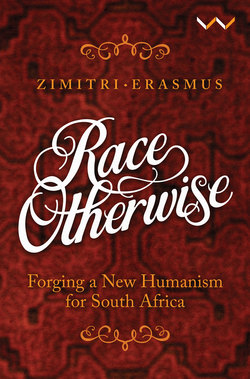Читать книгу Race Otherwise - Zimitri Erasmus - Страница 18
На сайте Литреса книга снята с продажи.
Lived anti-racialism
ОглавлениеThe fourth experience I wish to share occurred during 2008 and 2009 when I worked with the team who wrote the policy against racism and racial harassment for UCT at the time, under the sage leadership of Crain Soudien. We worked with stories of staff and students (about UCT) that were much like our own. We collectively created the policy by drawing on these stories. For me, those meetings are best described as a lived sense of anti-racialism. It was a holistic experience: one that touched my intellect, my embodied self, my inner self and my relationship to others and to my past.10 What I felt, learned and imbibed during that process is best expressed by Veena Das (2007) when she writes about the Partition of India and about the questions: What does it mean to inhabit a world? How does one make a world anew? What does it mean to pick up the pieces of a past that weighs so heavily on the present, and to live on in the very place of one’s wounding?
To bring her insights, and her very words, to bear on what I refer to here as a lived experience of anti-racialism would mean to describe this experience as follows: the ‘concrete relations that we establish[ed]’ as a team by living with the stories of others were ‘like the shadows of the more abstract questions’ before us: How do we help cultivate an anti-racial social ethos? How do we help stop the racial violence of the everyday? How do we infuse the idea of anti-racialism with life? How do we begin to make it ordinary? For Das, we learn how to make our worlds anew ‘in the process of such living’. For, she posits, ‘[w]ords, when they lead lives outside the ordinary, become emptied of experience, lose touch with life ...’ (Das 2007: 5).
Another way of describing this lived sense of anti-racialism is to say that as a group of people working and thinking together we held onto one another as we tried to change what Hinterberger (2012) calls ‘the population imagination’ – the ‘blood of government’ (a phrase I borrow from Paul Kramer [2006]) that manages difference and inequality – by cultivating an ethos of contesting inequality and living-together-indifference.
